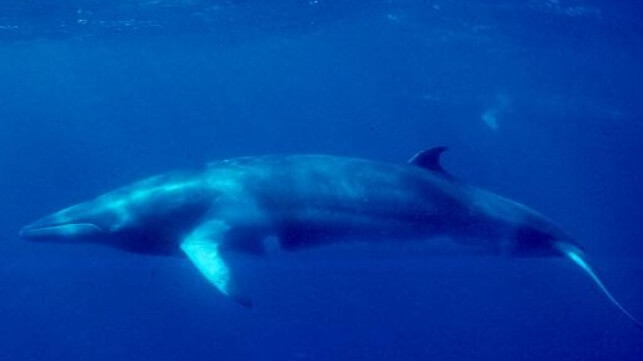U.S.-Backed Study on Whale Hearing Suspended After Whale's Death

A controversial research project in Norway aimed at understanding how whales respond to ocean noise has been suspended after it caused the death of a minke whale.
The Norwegian Defence Research Establishment (FFI) announced that it has been forced to put on hold the minke whale hearing project off the coast of Norway after severe weather damaged the project testing site, leading to the death of a trapped minke whale.
The death has drawn an outrcy from activists who are opposed to the U.S-backed project, with the Animal Welfare Institute (AWI) describing the death of the minke whale “an accident that has been waiting to happen”.
The research, which has been undertaken each summer since 2021, involves blocking a passageway between islands with barrier nets and herding individual migrating juvenile minke whales into an aquatic pen, trapping them inside.
The researchers then attempt auditory evoked potential testing, placing electrodes on the whale to measure brain waves for up to six hours to determine how the animal might react to active naval sonar and noise from the renewable energy sector, seismic exploration and cargo and cruise ships. Blood samples would also be taken to test for stress markers.
This year, the research jointly funded by FFI, the U.S Navy and other U.S government agencies, has aborted at the preparatory stages. Severe weather with gale force winds and extreme tidal currents damaged the testing site, and the research team discovered that one minke whale had become entangled and died in a barrier line that had broken free.
The agency said that following the death, the project will remain on hold until the incident has been thoroughly reviewed. The project testing site has been repaired to ensure safety.
The proponents of the controversial study believe that understanding what a whale can hear is the first step in determining what kinds of human-made ocean noise might affect them, which ultimately helps in the development of protection measures. Human-made sound can potentially affect a whale’s hearing, even at long ranges, and could impact the ability to navigate, find food and avoid hazards.
The need for the research has become more vital owing to increasing ocean activities not only for military purposes like sonar, commercial shipping, cruise industry, seismic exploration but also from the offshore wind industry, which is flourishing across the globe.
Animal rights defenders and scientists have however come out strongly against the project, repeatedly imploring on Norwegian and U.S agencies to rescind research permits and funding given its potential harm to whales.
AWI is calling for the project’s “immediate and permanent” shutdown given that researchers have failed for three years to obtain any data.

that matters most
Get the latest maritime news delivered to your inbox daily.
“This experiment has been an accident waiting to happen from the start, and a gross misuse of U.S taxpayer dollars,” said Kate O’Connell, marine wildlife consultant for AWI.
Last year, AWI revealed that through the Freedom of Information Act, it was able to establish that the U.S government was spending $3.7 million to co-fund the study and two related projects. Energy giant Equinor contributed an additional $60,000 toward the study’s tagging devices. The research was scheduled to conclude in 2024.
